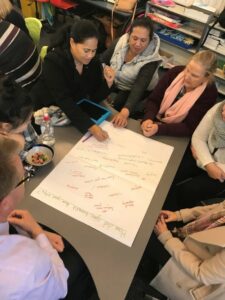Over the last approximately 15 years, I have talked about play to sport coaches, parents, teachers or school staff, and in the last 4 years, business owners and managers. The reason the title includes the word REPLAY is that very early on in the discussion, with all these adults, I mention what play looked like for me as a school aged young person in the 1970s. With almost no exceptions, these adults would recount their childhood play experiences involving independent play, with rarely any mention of adult involvement. This gives me the opportunity to state, that in general, kids now have way less freedom to play independently.
In my late 40s, I completed a university degree in Coaching and Exercise Science. In my coaching subject I became interested in Long Term Athlete Development (LTAD). LTAD studies are interested in what elite athletes did over the course of their life, compared to the average athlete. These studies showed these athletes had lots of independent, unstructured & small-sided play over their early years and into their teens, many continuing into their professional sports career.
In my roles involving, coaching young people, coach support and development, I discussed with parents and coaches around the need for kids to have as much unstructured play and the opportunity to try different sports and activities. In general, the LTAD studies showed that elite athletes had not specialised until their mid-late teens. When talking with the parents and coaches a vast majority would say their own skill development was mainly done through playing with other kids in their neighbourhood or sports team independently of coaching from any adults. Pelè (1), the great Brazilian football player, states “Because I lived in Santos, a lot of people think I learned on the beach. No, I didn’t learn on the beach, I learned in the street. There, I think, I took a lot of important things for my life.”
Most parents I have talked with have wanted their children to develop into happy, independent, confident and resilient adults that can critically think and can form successful relationships, over, achieving in a sport, activity or field of work. Usually, the later comes after the former. Independent play is crucial for children and young people to develop into healthy functioning adults. Dr Peter Gray (2) links the decline in play to the increase in children’s mental health issues stating, “one thing we know about anxiety and depression is that they correlate significantly with people’s sense of control or lack of control over their own lives.” So structured activity, with being told what to do all the time, can be unhealthy.
Having promoted play and playful activity in schools for the last decade, with 4 years focused on supporting schools in developing their play opportunities and environments, then the last 3 years resourcing large loose parts (junk) play through Magic Play Box, I have talked a lot about play with teachers and school staff. My focus was increasing independent play outside of curriculum time, and as breaks to classroom time to support learning. Left to their own devices in play, particularly junk play, children will develop their thinking, relating to others, using language, symbols & texts, managing self, participating & contributing (the key competencies in the NZ Curriculum). On top of these competencies and just as important, are the development of creativity & imagination, and connecting with oneself, others & the environment. Sir Ken Robinson (3) states, “People have immense deep talents that are often overlooked by the systems that are designed to educate them or take care of them.”
When first approaching companies or organisations, for supplying junk for Magic Play Box, the business owners or managers in many cases are first puzzled by what I am doing with Magic Play Box. After the initial discussion as described in the first paragraph, I relate what independent play has to do with companies and working adults. In 2017, 100 companies got together and stated that they did not necessary need employees to have degrees. They identified critical thinking, creativity, communication and cooperation are the main skills they are looking for. These align to the key competencies in the NZ Curriculum. On top of these soft skills, Caroline Beaton (4) mentions, Focus, Curiosity, commitment, agility and humility as important to top employers. If the person has these soft skills the companies say they can train them in the necessary technical or hard skills. The key to developing these soft skills is through progressively exploring the world, experimenting with ideas and engaging with others through play.

Adults will over schedule children into structured adult run activities (that should be playful and fun) with a goal of being really good at a technical or hard skill or keep them out of trouble. This often sacrifices the freedom of a child to explore more opportunities through independent play, to develop different skills and find out what they are good at, interested in and develop passion for. Alan Watts (5) said, “If you do it for a result in the future, you are not doing it.” He also said, “This is the real secret of life, to be completely engaged with what you are doing in the here and now and instead of calling it work, realise it is play.” With Magic Play Box, we get requests for certain contents to be in the boxes. We politely say we put what is available to us and that if an adult is selecting the junk, then more than likely they have an idea of what they want to do with it, which is counter to the randomness and creativity of junk play. Michael Rosen (6) states, “A toy is simply a physical prop that enables and enhances play. It might be a stick or a stone, an empty milk carton, a shoelace … What makes it a toy is how we transform and use it with our imaginations. The important thing is to see the potential within an item. “
In the discussions with adults, I obviously do not reference the sources I have in this article, but I do use the philosophies, ideas and examples amongst other sources and my own experience. The discussions are simpler but varied due to the innumerable scenarios experienced and viewpoints the adults have. The key point is that as adults we tend to have developed a viewpoint that play and playfulness is frivolous, unproductive and immature, whereas, it is the most productive learning, developmental and wellness tool we humans have.
“Play is the highest form of research.” – Albert Einstein
References:
- Pelè, In Search of Greatness, Documentary, directed by Gabe Polsky (2018; USA: IMG Films), Film.
- Gray, P 2015, Free to Learn: Why Unleashing the Instinct to Play Will Make Our Children Happier, More Self-Reliant, and Better Students for Life, Basic Books, New York.
- Sir Ken Robinson, In Search of Greatness, Documentary, directed by Gabe Polsky (2018; USA: IMG Films), Film.
- Caroline Beaton, Top Employers Say Millennials Need These 4 Skills in 2017, Forbes.com, retrieve 18/01/2023 from https://www.forbes.com/sites/carolinebeaton/2017/01/06/top-employers-say-millennials-need-these-4-skills-in-2017/?sh=37f37b247fe4
- Watts, A 1977, The Essence of Alan Watts, Millbrae, California.
- Rosen, M 2019, Michael Rosen’s Book of Play, Profile Books Ltd, London.

